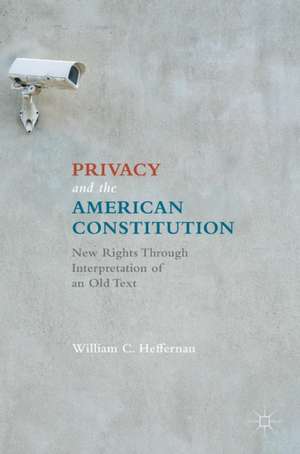Privacy and the American Constitution: New Rights Through Interpretation of an Old Text
Autor William C. Heffernanen Limba Engleză Hardback – 22 noi 2016
This book explains a paradox in American constitutional law: how a right not discussed during the ratification debates at Philadelphia and not mentioned in the text has become a core component of modern freedom. Rather, privacy is a constitutional afterthought that has gained force through modern interpretations of an old text. Heffernan defends privacy rights against originalist objections to its inclusion in modern constitutional doctrine, analyzes the structure of privacy claims, and provides a blueprint for protecting privacy against government incursion.
The book will appeal to a wide audience of students and researchers of criminal procedure, constitutional history, law-and-society, and sociology of law. Lawyers will find this book extremely valuable in addressing the statutory issues associated with modern privacy law.
The book will appeal to a wide audience of students and researchers of criminal procedure, constitutional history, law-and-society, and sociology of law. Lawyers will find this book extremely valuable in addressing the statutory issues associated with modern privacy law.
At last, a book about constitutional interpretation that speaks plain English and makes sense. It’s the best work I know on the subject, yet that subject is not the one it’s mostly about. The book mostly tells the story of the constitutional right to privacy and how it emerged from provisions that at the outset were not much about privacy at all. On that subject, the book is definitive. It’s also fascinating, probing, engaging, insightful, and wonderfully presented. Privacy and the American Constitution is a stellar contribution to knowledge.
Albert W. Alschuler, Julius Kreeger of Law and Criminology, Emeritus, University of Chicago
A powerful and innovate contribution to constitutional law. Not only does Heffernan offer us a fascinating and persuasive account of how modern constitutional rights grew out of the personal space offered to us in an earlier era, he also explains why privacy rights deserve the newfound importance they have in our modern jurisprudence, based upon the same Madisonian approach to constitutional interpretation that justifies other central parts of modern constitutional law.
Marc Jonathan Blitz, Alan Joseph Bennett Professor of Law, Oklahoma City University School of Law
Albert W. Alschuler, Julius Kreeger of Law and Criminology, Emeritus, University of Chicago
A powerful and innovate contribution to constitutional law. Not only does Heffernan offer us a fascinating and persuasive account of how modern constitutional rights grew out of the personal space offered to us in an earlier era, he also explains why privacy rights deserve the newfound importance they have in our modern jurisprudence, based upon the same Madisonian approach to constitutional interpretation that justifies other central parts of modern constitutional law.
Marc Jonathan Blitz, Alan Joseph Bennett Professor of Law, Oklahoma City University School of Law
| Toate formatele și edițiile | Preț | Express |
|---|---|---|
| Paperback (1) | 728.53 lei 6-8 săpt. | |
| Springer International Publishing – 28 iun 2018 | 728.53 lei 6-8 săpt. | |
| Hardback (1) | 909.13 lei 6-8 săpt. | |
| Springer International Publishing – 22 noi 2016 | 909.13 lei 6-8 săpt. |
Preț: 909.13 lei
Preț vechi: 1108.70 lei
-18% Nou
Puncte Express: 1364
Preț estimativ în valută:
173.96€ • 179.47$ • 145.17£
173.96€ • 179.47$ • 145.17£
Carte tipărită la comandă
Livrare economică 26 martie-09 aprilie
Preluare comenzi: 021 569.72.76
Specificații
ISBN-13: 9783319431345
ISBN-10: 331943134X
Pagini: 305
Ilustrații: IX, 348 p.
Dimensiuni: 148 x 210 x 25 mm
Greutate: 5.66 kg
Ediția:1st ed. 2016
Editura: Springer International Publishing
Colecția Palgrave Macmillan
Locul publicării:Cham, Switzerland
ISBN-10: 331943134X
Pagini: 305
Ilustrații: IX, 348 p.
Dimensiuni: 148 x 210 x 25 mm
Greutate: 5.66 kg
Ediția:1st ed. 2016
Editura: Springer International Publishing
Colecția Palgrave Macmillan
Locul publicării:Cham, Switzerland
Cuprins
1. Constitutional Afterthoughts.- 2. The Right to Wear a Hat—and Other Afterthoughts.- 3. Developmental Supplementation.- 4. From Property to Privacy.- 5. The Emergence of Privacy Norms in Nineteenth Century America.- 6. The Nineteenth Century Court Reads the Eighteenth Century Text.- 7. From Thoughts and Beliefs to Emotions and Sensations.- 8. An Exercise in Supplementation that Failed.- 9. Ambitious Supplementation.- 10. Unobtrusive Supplementation.- 11. Informational Privacy Imperiled.- 12. Reappraising the Constitutional Past.
Notă biografică
William C. Heffernan is a professor at John Jay College of Criminal Justice, City University of New York, USA. An expert on constitutional criminal procedure, he is the author of Dimensions of Justice: Ethical Issues in the Administration of Criminal Law. He also edited From Social Justice: Poverty and the Administration of the Criminal Law.
Textul de pe ultima copertă
This book explains a paradox in American constitutional law: how a right not discussed during the ratification debates at Philadelphia and not mentioned in the text has become a core component of modern freedom. Rather, privacy is a constitutional afterthought that has gained force through modern interpretations of an old text. Heffernan defends privacy rights against originalist objections to its inclusion in modern constitutional doctrine, analyzes the structure of privacy claims, and provides a blueprint for protecting privacy against government incursion.
The book will appeal to a wide audience of students and researchers of criminal procedure, constitutional history, law-and-society, and sociology of law. Lawyers will find this book extremely valuable in addressing the statutory issues associated with modern privacy law.
The book will appeal to a wide audience of students and researchers of criminal procedure, constitutional history, law-and-society, and sociology of law. Lawyers will find this book extremely valuable in addressing the statutory issues associated with modern privacy law.
At last, a book about constitutional interpretation that speaks plain English and makes sense. It’s the best work I know on the subject, yet that subject is not the one it’s mostly about. The book mostly tells the story of the constitutional right to privacy and how it emerged from provisions that at the outset were not much about privacy at all. On that subject, the book is definitive. It’s also fascinating, probing, engaging, insightful, and wonderfully presented. Privacy and the American Constitution is a stellar contribution to knowledge.Albert W. Alschuler, Julius Kreeger of Law and Criminology, Emeritus, University of Chicago
A powerful and innovate contribution to constitutional law. Not only does Heffernan offer us a fascinating and persuasive account of how modern constitutional rights grew out of the personal space offered to us in an earlier era, he also explains why privacy rights deserve the newfound importance they have in our modern jurisprudence, based upon the same Madisonian approach to constitutional interpretation that justifies other central parts of modern constitutional law.
Marc Jonathan Blitz, Alan Joseph Bennett Professor of Law, Oklahoma City University School of Law
A powerful and innovate contribution to constitutional law. Not only does Heffernan offer us a fascinating and persuasive account of how modern constitutional rights grew out of the personal space offered to us in an earlier era, he also explains why privacy rights deserve the newfound importance they have in our modern jurisprudence, based upon the same Madisonian approach to constitutional interpretation that justifies other central parts of modern constitutional law.
Marc Jonathan Blitz, Alan Joseph Bennett Professor of Law, Oklahoma City University School of Law
Caracteristici
Contributes a thorough understanding of constitutional transformation Uniquely offers both an account of the logic of developmental supplementation while analyzing the complementarity of the different facets of privacy Presents a complex paradox clearly and accessibly









